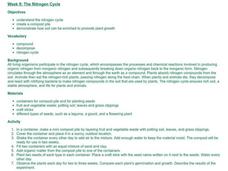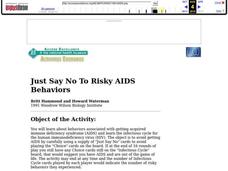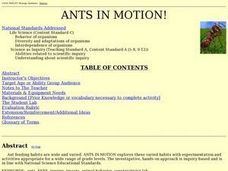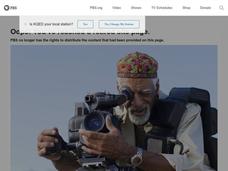Curated OER
Archery
Students study archery. In this archery lesson, students develop basic archery and hunter safety skills. Students discuss the history of archery and bow hunting.
Curated OER
Basic Orienteering
Learners study orienteering. In this science lesson, students study the parts of a compass and use the compass to set a bearing and follow the bearing on the compass.
Curated OER
Now You See It, Now You Don't
Students determine their eye's blind spot. In this biology lesson plan, students explain what causes this visual deficiency. They give real life applications of this concept.
Curated OER
Saving Humpty Dumpty;Recycling, Environmental Science, Math, Ecology, Athletic Shoes
Students describe how shoe design, manufacturing, retailing, consumer use, and disposal impact environments and societies. They discuss ways to reduce, reuse, or recycle resources in the life-cycle for a shoe product.
Curated OER
Liver
Students study the livers parts and functions then follow a lab experiment to watch first hand how the gut uses bile to physically break down fatty substances into smaller pieces.
Curated OER
Who Was Charles Darwin?
Students research the life of Charles Darwin and his voyage on the Beagle.
Curated OER
Kepler and his Laws
High schoolers examine Kepler's Laws. They confirm Kepler's 3rd law by comparing orbital periods and mean distances for all major planets and study conic sections, qualitatively.
Curated OER
Why Are Volcanoes Dangerous?
Students investigate the causes and characteristics of volcanic eruptions including pyroclastic eruptions. They study the effects of natural disasters.
Curated OER
Comparing Temperature, Pressure, and Humidity
Students investigate data on temperature, pressure, and humidity by downloading information from the ARM Website. Working in groups, they discover how weather impacts life in each of the ARM sites. They record weather data in their...
Curated OER
Oil and Gas As A Source of Energy
Students discuss the reasons why oil and gas are the United States' main source of energy. In groups, they use the internet to research how the resources are formed and the amount of consumption by the United States. They choose books...
Curated OER
The Nitrogen Cycle
Students design and create a compost pile in order to study the Nitrogen Cycle. They then use the scientific method to determine if plants grow better when they add organic matter from their compost pile to the plant's soil.
Curated OER
Abundant Lakes
Students define lake life zones. They define stormwater runoff and its effects on lakes. They identify the relationship between decaying substances and water pollution. They construct a freshwater food web.
Curated OER
Just Say No To Risky Aids Behaviors
Students discover the behaviors associated with getting acquired immune deficiency syndrome (AIDS) and study the infectious cycle for the human immunodeficiency virus (HIV) by playing a board game. They play in small groups.
Curated OER
Ants In Motion
Students brainstorm ants and their characteristics in a class discussion. They observe the ants and answer question pertaining to their behavior; then they apply the scientific method in creating and investigating a problem.
Curated OER
Brain Manipulative Model
Students visualize the major human brain divisions by using a manipulative puzzle to discover the names and functions of the regions. They use this hands-on anatomy aid to study the braqin regions.
Curated OER
Robotic Arm
Students encounter a real-life robotic arm that may help stroke victims regain control of their environment. The Robotic physical therapy--the new science. They research the history and foundation to this unique alternative to long care...
Curated OER
Cypress/Tupelo Swamps
Young scholars study the geologic history of terrain, soils, and drainage patterns. They recognize ecological processes that determine the dynamic nature of habitats. They investigate the influence of human activity on the landscape.
Curated OER
Science: What Is the Carbon Cycle?
Young scholars examine the carbon cycle while identifying its sources, sinks, and release agents. Using magazines and newspapers, groups of students design collages illustrating the carbon cycle. Finally, they write responses to...
Curated OER
Groundwater as Part of the Water Cycle
Ninth graders study the effects of soil and rocks on filtering groundwater. In this groundwater lesson students complete a lab activity that includes sources of contamination.
Curated OER
Acid Rain: Where Have All the Rainbows Gone?
Students study the pH scale and sources of acid precipitation. In this acid rain lesson students complete a lab on acid rain then complete a handout.
Curated OER
Build the Tallest Building
Students study skyscrapers and how they were constructed. In this tallest building instructional activity students construct a model of the tallest building in the world.
Curated OER
Making Blood!
Ninth graders study facts about human blood and what it is made of. In this blood composition lesson students divide into groups and complete several activities.
Curated OER
Innovations in Obstetrics and Pediatrics
Pupils study the history in obstetrics and pediatrics. In this investigative lesson students research and present information about winners of the Nobel Prize.
Curated OER
A Pre-Treatment Model for Ethanol Production Using a Colorimetric Analysis of Starch Solutions
Learners recognize the benefits of ethanol and study photosynthesis. In this ethanol lesson students complete an experiment that shows the procedure that starch can be hydrolyzed by salivary amylase.
Other popular searches
- Life Skills Worksheet
- Life Skills Math
- Life Skills Lesson Plans
- Real Life Skills
- Math in Daily Life
- Special Education Life Skills
- Basic Life Skills
- Life Skills Lessons
- Nutrition Life Skills
- Plantation Daily Life
- Life Skills Lesson Money
- Computer Budget Life Skills

























